This wiki is no longer being updated as of December 10, 2025.
|
Dynamics:Express Entry:Custom Mapping: Difference between revisions
No edit summary |
No edit summary |
||
| Line 4: | Line 4: | ||
{{CustomTOC}} | {{CustomTOC}} | ||
This covers how to configure | This covers how to configure the Melissa Express Entry solution (ver. 1.5.1.16 or later) for Dynamics CRM in order to support custom mappings for fields and custom entities. This will help you to map the autocomplete address fields on out of box entities to different fields. | ||
==Navigate to Configuration== | ==Navigate to Configuration== | ||
1. Begin by navigating to the configuration screen. If you need more details on locating the configuration screen, see the [[Dynamics:Express Entry:Configuration|Configuration tutorial]]. | 1. Begin by navigating to the configuration screen. If you need more details on locating the configuration screen, see the [[Dynamics:Express Entry:Configuration|Configuration tutorial]]. | ||
[[File: | [[File:Dynamics_ExpressEntry_CustomMapping_01_Configuration.png|frame|none|Navigate to Configuration]] | ||
| Line 15: | Line 15: | ||
2. Click the '''Advanced Mapping''' tab in order to begin the mapping process. In this tab, the custom field mappings that our custom scripts call will be assigned. | 2. Click the '''Advanced Mapping''' tab in order to begin the mapping process. In this tab, the custom field mappings that our custom scripts call will be assigned. | ||
[[File: | [[File:Dynamics_ExpressEntry_CustomMapping_02_AdvancedMapping.png|frame|none|Click '''Advanced Mapping''']] | ||
| Line 21: | Line 21: | ||
3. Click the '''Load Entities''' button. This queries the Dynamics organization for a full list of the entities that exist within your system and populates the list of attributes that are associated with the entity. | 3. Click the '''Load Entities''' button. This queries the Dynamics organization for a full list of the entities that exist within your system and populates the list of attributes that are associated with the entity. | ||
[[File: | [[File:Dynamics_ExpressEntry_CustomMapping_03_LoadEntities.png|frame|none|Click '''Load Entities''']] | ||
| Line 27: | Line 27: | ||
4. Select the desired entity in the dropdown list. | 4. Select the desired entity in the dropdown list. | ||
[[File: | [[File:Dynamics_ExpressEntry_CustomMapping_04_SelectEntity.png|frame|none|Select Entity]] | ||
| Line 36: | Line 36: | ||
5. Type the name of the desired custom or out of box field. In order to assist the field entry process, the field names should be auto-completed with only the correct field names for that entity. | 5. Type the name of the desired custom or out of box field. In order to assist the field entry process, the field names should be auto-completed with only the correct field names for that entity. | ||
[[File: | [[File:Dynamics_ExpressEntry_CustomMapping_05_FieldName.png|frame|none|Type Field Name]] | ||
The names should be the exact names that are assigned in Dynamics. These names can be viewed in the '''Fields''' section for that particular entity in your default solution. | The names should be the exact names that are assigned in Dynamics. These names can be viewed in the '''Fields''' section for that particular entity in your default solution. | ||
After the field names have been filled in, please click the '''Save Mapping''' button to save your settings. | After the field names have been filled in, please click the '''Save Mapping''' button to save your settings. | ||
[[File: | [[File:Dynamics_ExpressEntry_CustomMapping_05b_SaveMapping.png|frame|none|Click '''Save Mapping''']] | ||
==Navigate to Default Solution== | ==Navigate to Default Solution== | ||
6. Once this has been set, the necessary web resources and event handlers will need to be added onto the form. Navigate to the ''' | 6. Once this has been set, the necessary web resources and event handlers will need to be added onto the form. Navigate to the custom entity's main '''Form'''. | ||
[[File: | [[File:Dynamics_ExpressEntry_CustomMapping_06_CustomEntity.png|frame|none|Navigate to entity's '''Form''']] | ||
==Access Form Properties== | ==Access Form Properties== | ||
7. | 7. Click the main form '''Information''' to access the '''Main Form'''. | ||
[[File: | [[File:Dynamics_ExpressEntry_CustomMapping_07_MainForm.png|frame|none|Access '''Main Form''']] | ||
==Add Web Resources== | ==Add Web Resources== | ||
8. Click the '''Add''' button to begin adding a | 8. Click the '''Add''' button to begin adding a library. | ||
[[File: | [[File:Dynamics_ExpressEntry_CustomMapping_08_AddLibraries.png|frame|none|Click '''Add''']] | ||
| Line 70: | Line 67: | ||
9. Search for '''<code>md_ee_autocomplete</code>'''. There should be two options available: <code>md_ee_autocomplete1</code> and <code>md_ee_autocomplete2</code>. Add both of these resources to the form properties. Dynamics requires these resources to be added one at a time. | 9. Search for '''<code>md_ee_autocomplete</code>'''. There should be two options available: <code>md_ee_autocomplete1</code> and <code>md_ee_autocomplete2</code>. Add both of these resources to the form properties. Dynamics requires these resources to be added one at a time. | ||
[[File: | [[File:Dynamics_ExpressEntry_CustomMapping_09_SearchAutocomplete.png|frame|none|Search for '''md_ee_autocomplete''']] | ||
| Line 76: | Line 73: | ||
10. Once the web resources have been added to the form, the necessary event handlers will need to be added. Click the '''Add''' button in the lower section of the '''Form Properties'''. | 10. Once the web resources have been added to the form, the necessary event handlers will need to be added. Click the '''Add''' button in the lower section of the '''Form Properties'''. | ||
[[File: | [[File:Dynamics_ExpressEntry_CustomMapping_010_AddEventHandlers.png|frame|none|Click '''Add''']] | ||
| Line 98: | Line 95: | ||
</ol> | </ol> | ||
</ol> | </ol> | ||
The entire list of event handlers should be a total of 8 functions. | The entire list of event handlers should be a total of 8 functions. | ||
[[File: | [[File:Dynamics_ExpressEntry_CustomMapping_011_EventHandlerList.png|frame|none|Event Handler List]] | ||
| Line 111: | Line 104: | ||
12. After the event handlers and web resources have been added to the form, save the form and publish these customizations. The Express Entry auto-completion service should now function properly on your entity. | 12. After the event handlers and web resources have been added to the form, save the form and publish these customizations. The Express Entry auto-completion service should now function properly on your entity. | ||
[[File: | [[File:Dynamics_ExpressEntry_CustomMapping_012_Autocomplete.png|frame|none|Auto-complete]] | ||
*Note: The out of box entities should already be set to the default values of address fields on the form and will not require configuration. | *Note: The out of box entities should already be set to the default values of address fields on the form and will not require configuration. | ||
Revision as of 16:58, 22 March 2019
← Clean Suite for CRM:Dynamics
| Express Entry Navigation |
|---|
| Overview |
| Installation |
| Configuration |
| Custom Mapping |
| Tutorial |
This covers how to configure the Melissa Express Entry solution (ver. 1.5.1.16 or later) for Dynamics CRM in order to support custom mappings for fields and custom entities. This will help you to map the autocomplete address fields on out of box entities to different fields.
1. Begin by navigating to the configuration screen. If you need more details on locating the configuration screen, see the Configuration tutorial.

Advanced Mapping
2. Click the Advanced Mapping tab in order to begin the mapping process. In this tab, the custom field mappings that our custom scripts call will be assigned.
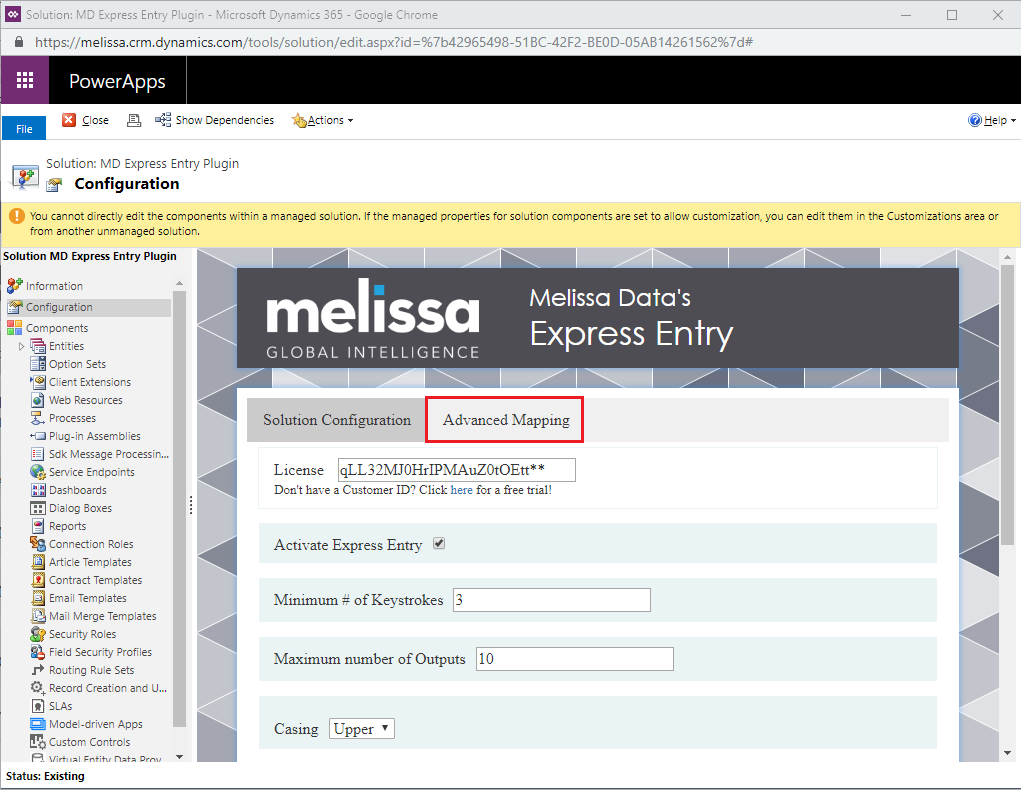
Load Entities
3. Click the Load Entities button. This queries the Dynamics organization for a full list of the entities that exist within your system and populates the list of attributes that are associated with the entity.
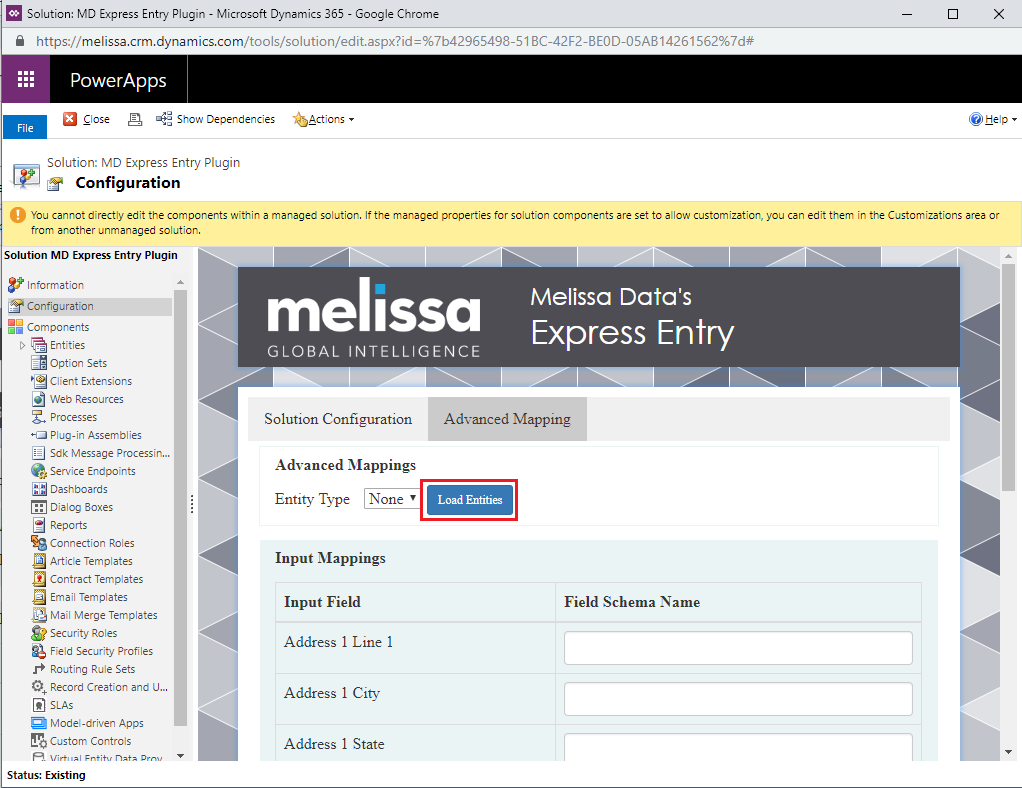
Select Entity
4. Select the desired entity in the dropdown list.

If a mapping has already been established for a particular entity, the fields should automatically be populated with the previous values.
Type Field Name
5. Type the name of the desired custom or out of box field. In order to assist the field entry process, the field names should be auto-completed with only the correct field names for that entity.

The names should be the exact names that are assigned in Dynamics. These names can be viewed in the Fields section for that particular entity in your default solution.
After the field names have been filled in, please click the Save Mapping button to save your settings.
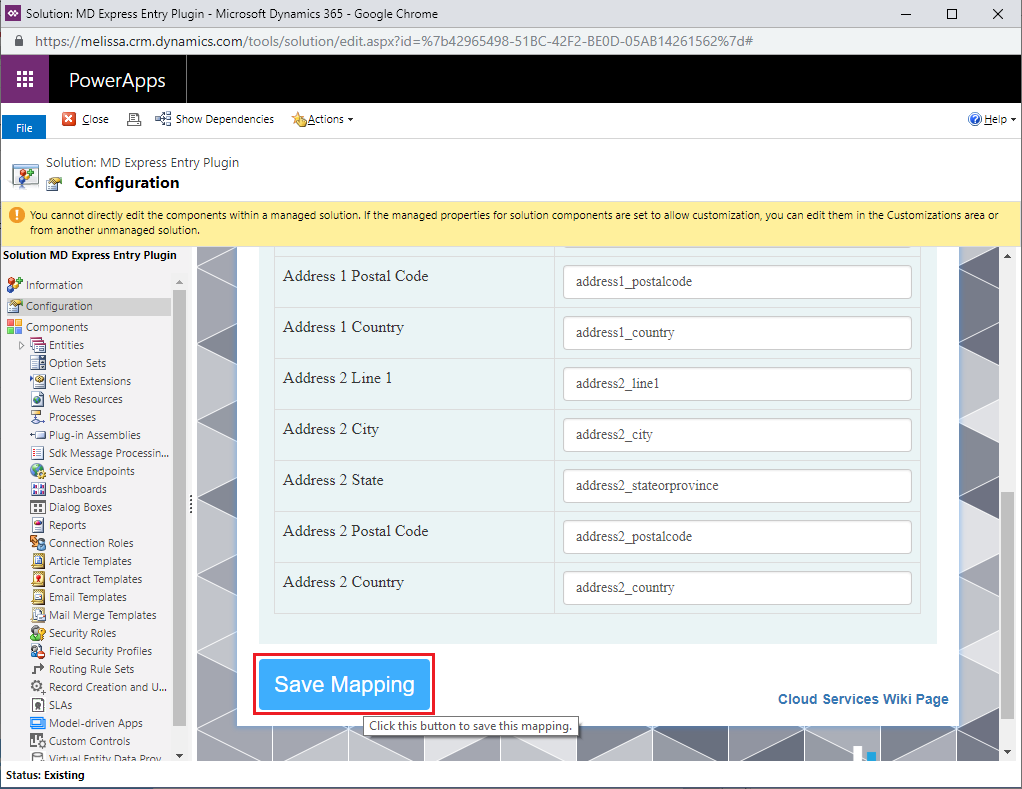
6. Once this has been set, the necessary web resources and event handlers will need to be added onto the form. Navigate to the custom entity's main Form.
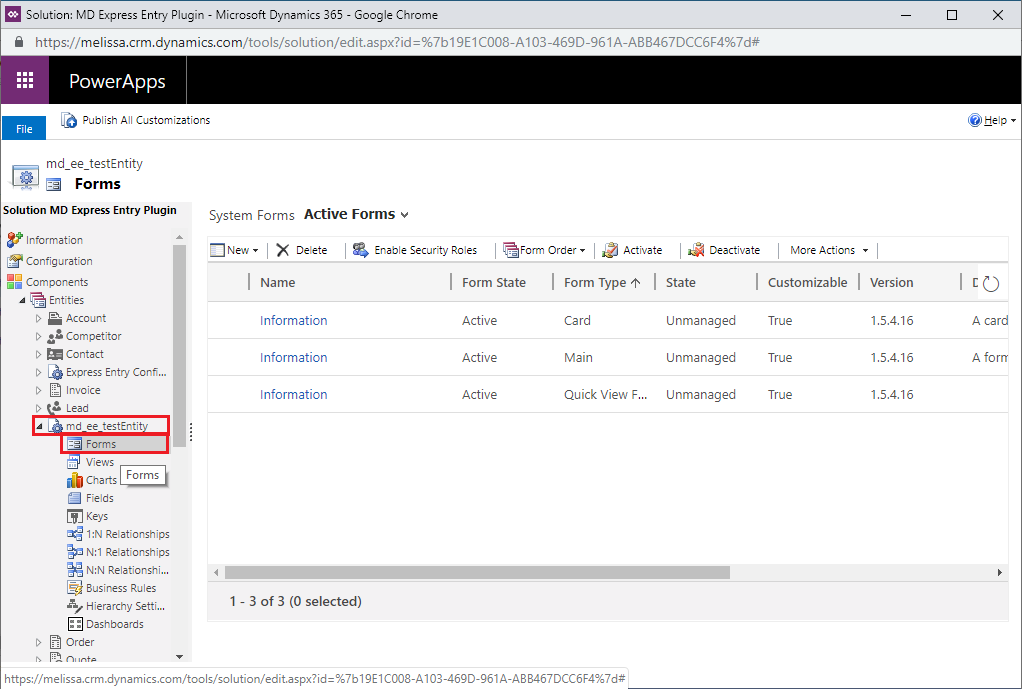
Access Form Properties
7. Click the main form Information to access the Main Form.
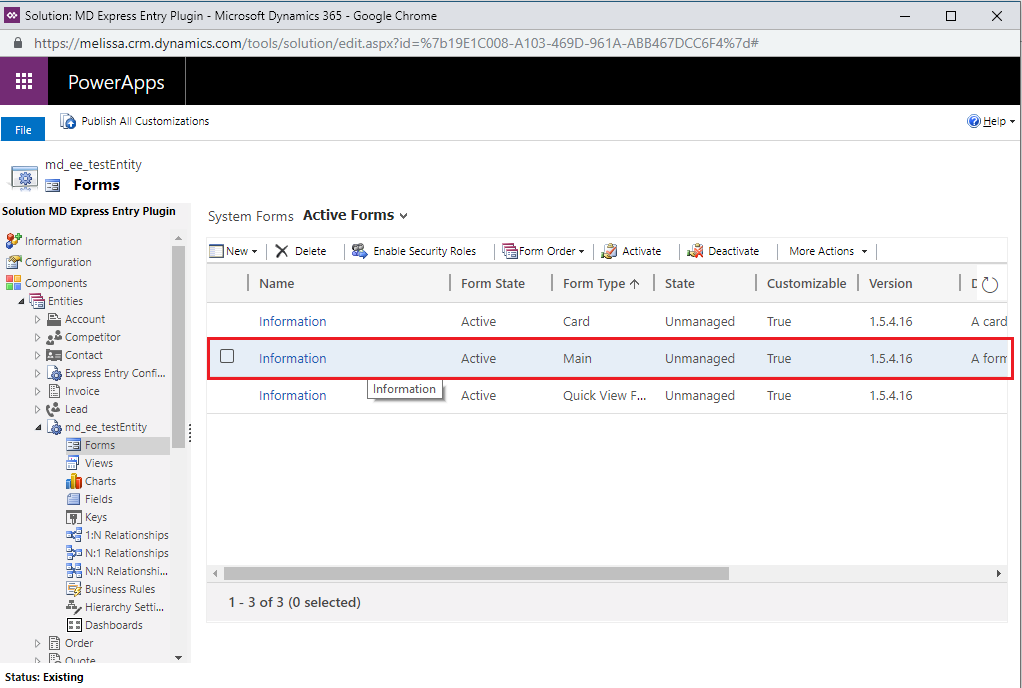
Add Web Resources
8. Click the Add button to begin adding a library.
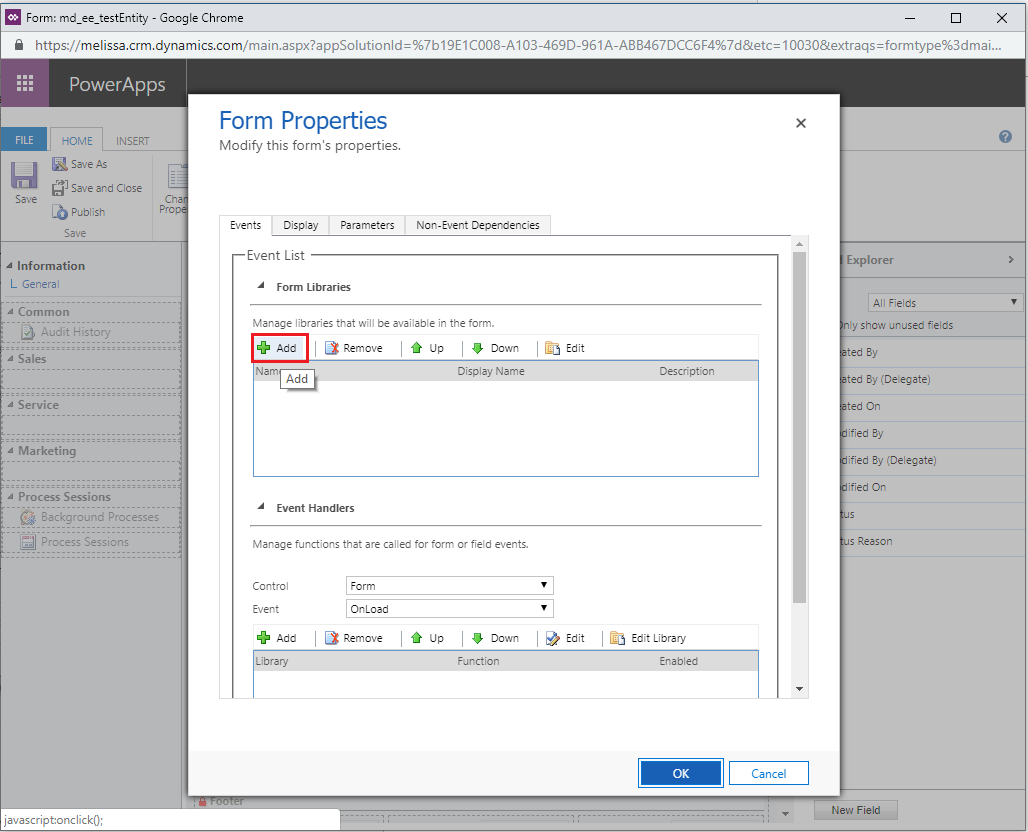
Search for Auto-complete
9. Search for md_ee_autocomplete. There should be two options available: md_ee_autocomplete1 and md_ee_autocomplete2. Add both of these resources to the form properties. Dynamics requires these resources to be added one at a time.
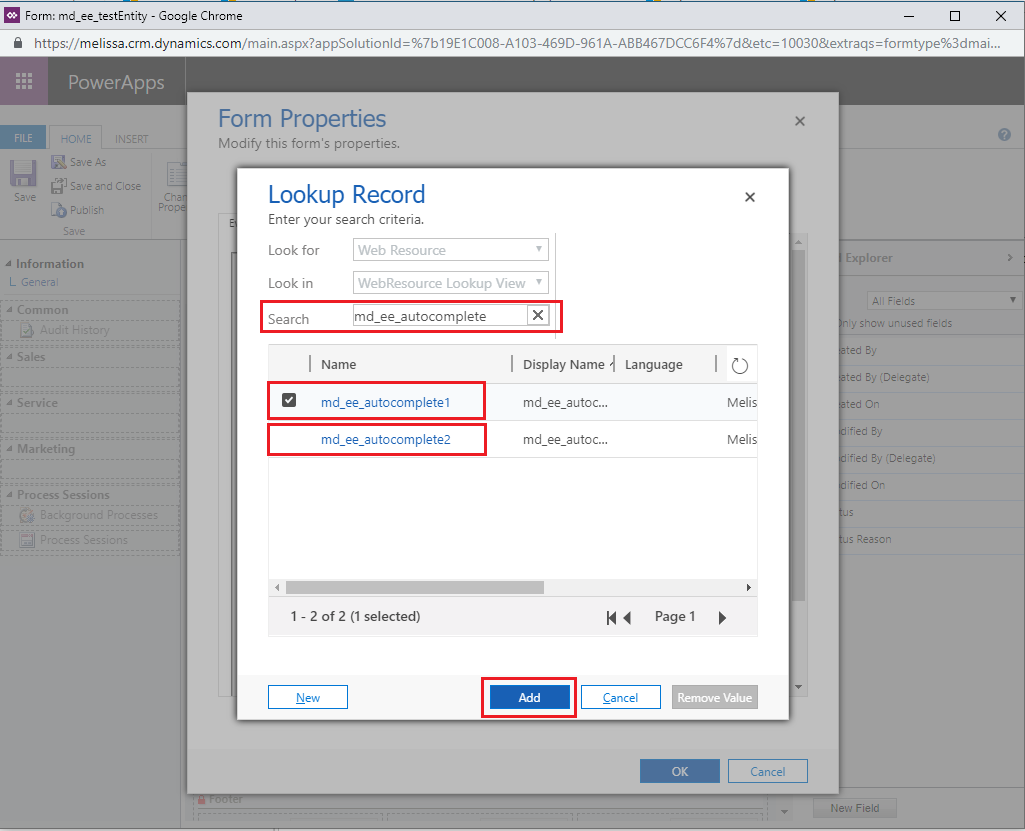
Add Event Handlers
10. Once the web resources have been added to the form, the necessary event handlers will need to be added. Click the Add button in the lower section of the Form Properties.

Handler Properties
11. In the Handler Properties window, please add the following functions:
- Library: md_ee_autcomplete1
- ExpressEntry
- ExpressEntryCity
- ExpressEntryZip
- ExpressEntryCountry
- Library: md_ee_autocomplete2
- ExpressEntry2
- ExpressEntryCity2
- ExpressEntryZip2
- ExpressEntryCountry2
The entire list of event handlers should be a total of 8 functions.
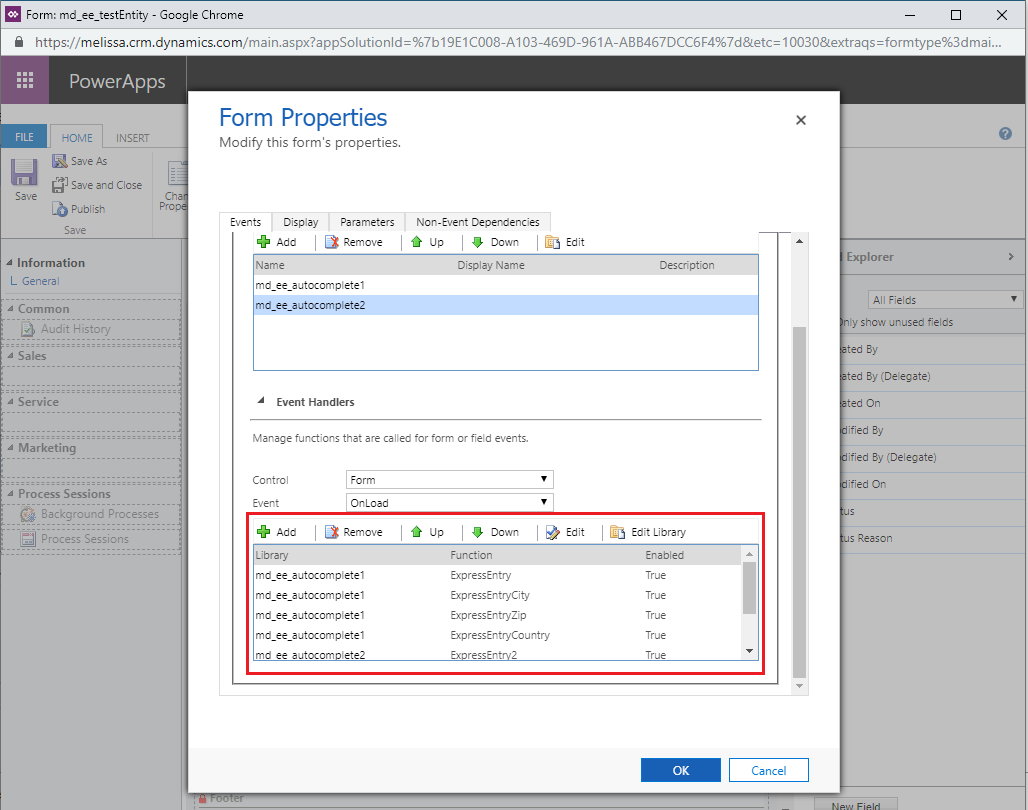
Save Form
12. After the event handlers and web resources have been added to the form, save the form and publish these customizations. The Express Entry auto-completion service should now function properly on your entity.

- Note: The out of box entities should already be set to the default values of address fields on the form and will not require configuration.